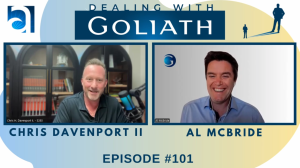- Are favours like bread or like wine?
-
How this different perception is the root of much frustration and perceived overreaction.
-
Building a buffer
-
The benefits of building trust in your deals and contracts
-
Are you in credit or about to be overdrawn?
Transcript
Al McBride 0:03
Welcome to the dealing with Goliath podcast. This is a solo espresso episode that I call the Bank of goodwill. Are you in credit or overdrawn?
Al McBride 0:17
So something reminded me the other day of a conversation I had with a friend of mine a few years ago, and it was over coffee. And he was quite flustered, you know, quite frustrated. And, of course, it’s sort of what’s the matter is what you say, right?
Al McBride 0:31
And very long story short, he had been helping his extended family quite a lot for a good number of months, or probably even years at that stage. And he had to turn down a particular request, I can’t remember what it was.
Al McBride 0:50
That’s not the point doesn’t matter, he had to turn it down for relatively good reasons. And there was quite a level of disappointment and quite a negative reaction to this, which he found quite insulting.
Al McBride 1:04
Because, you know, he’d been a hugely helpful guy for a long time. And then the one time he says, No, no, can’t help you there can’t do it, bla, bla, bla, they get quite upset or quite angry. It was a negative reaction. And he felt the reaction was unwarranted, that it wasn’t really, it wasn’t fair. Right?
Al McBride 1:25
So I mentioned this idea of the Bank of goodwill, or the goodwill bank, whatever you want to credit me, whatever you want to call it. And I asked, Do you think you’re in credit? Or do you think you’re overdrawn?
Al McBride 1:38
And this was the point, nobody really knows, with this concept, where you are, what the number is, what your balance is, because we make these deposits by doing good gestures by being a decent person by being helpful.
Al McBride 1:58
You know, by by doing what we say we do, or but going above and beyond, we’re making a bigger deposit in credits with this person, okay with the other side. But we none of us know what that number is. And occasionally we disappoint and occasionally we drop the ball.
Al McBride 2:15
Sometimes we know about it, and we’re apologetic, sometimes you don’t even know we’ve done it, but that balance has taken it has taken a hit. It’s taken a dent, there’s been a withdrawal, right? But this is the question we never quite know.
Al McBride 2:30
When we’re overdrawn, right? When we go from being in the black and healthy enough to being in the red, and we’re in, we’re in trouble. And that’s where there’s often a lot of conflict and disappointment and frustration. Because one side thinks, Oh, well, I helped you all this time, I look at all the good things I’ve done for you.
Al McBride 2:50
Now you’re giving me this reaction. You know, I’ve done all this for you. And this is how you repay me the one time blah, blah, blah. And this is where it gets interesting. Because it reminds me of a study I read many years ago about favours. Right about what you might call, you know, adding that credit into adding making that deposit in the bank of goodwill.
Al McBride 3:16
Right? What are favorites? And the question, if I remember correctly, was our favors more like bread or more like wine? Ie. do they go off quickly? Or do they mature with age and grow in importance? And the answer is a nice one.
Al McBride 3:32
It clarifies why we have this disparity between, you know, the one giving the favors and one receiving the favors and equally in the bank of goodwill. You know, where you think quite you think you’re still in credit? I’ve loads on credit.
Al McBride 3:47
What do you mean, I’m overdrawn? I’m not overdrawn. The other side is you are so overdrawn, right? This is where the conflict lies, because the subtlety is that for the one giving the favor, the favors like wine, it grows over time, in importance in what you did, how you think of it, the amount of effort it took, all of these things tend to grow slowly in importance.
Al McBride 4:19
Eually, it’s like bread for the one receiving us that when you receive Oh, thanks very much. That was great. And then it lowers in importance over time, like bread goes stale, it goes off, it’s less useful, right?
Al McBride 4:33
So this is what first of all two things this is why this this much growing disparity between people and whether someone was in creditor in debt and the Bank of goodwill, but it also points with favors by the way as a simple aside way if you do a favor for someone, don’t be thinking like oh, I’m going to put that in the hip pocket.
Al McBride 4:55
You know, I’m going to put that in the pocket so that I’m ready to pull it out when I need to and say a favor, not a great policy, you’re better probably you’ll probably get better return on that favor.
Al McBride 5:07
If you ask for something, obviously reasonable and the spirit of goodwill, maybe sooner rather than later, just as a thought. But this is kind of the thing where when we talk about goodwill, and we start thinking maybe in terms of business clients, business relationships, that if you drop the ball, if you disappoint your client, are they likely to say typical? Or they’re likely to say, Oh, that’s unusual. That’s not like Al?
Al McBride 5:46
What story do they do they go down, because that’s where they’re already primed to go. And this is why good deal of what I do with clients is thinking about this emotionally intelligent approach, you might call, some have called it before, approach to the setup of how you work with clients, how you do deals, how you create agreements.
Al McBride 6:11
And it can be very simple things like simply saying, you’re going to do something, and you do it, these these little things, these little steps that build trust, because trust is huge, when you’re making agreements, particularly making financial contracts and deals.
Al McBride 6:26
A lot of research into trust shows that various numbers, but then when there’s a high trust between the parties, that the deal value is often 30%, or more higher than when there’s a moderate or low level of trust. But also, as you can imagine, not really rocket science.
Al McBride 6:46
But as you might imagine, deals are far more long term and far more robust. They last the length of time, far more easily when there’s trust there precisely because the reason that I just said so that when the setbacks, the explanation in the other side’s head, is Oh, that’s unlike Bob, that’s not like Mary at all, rather than that’s the final straw.
Al McBride 7:08
So it’s just something to have in your mind. When you’re dealing with people in social situations, or they have maybe a reaction you think is too much like whoa, where did that come from? their perception of where your credit is in their account. And that social relationship is different to yours.
Al McBride 7:31
It’s probably makes more sense, as I said, in business that you might think your Oh admin credit with all of my clients. Of course I am. Maybe you are, I’m not saying you’re not. But flip it the other way, with people where you’re the client.
Al McBride 7:48
Are some of those guys, are they in a ton of credit? Or are they getting slowly overdrawn? Are they getting close to going into the red, where you say, you know what, it’s not quite working out. I think I need to try a new vendor for x or y.
Al McBride 8:06
That might give you a slight feel that, yes, maybe once again, it is that particular vendor that you’re thinking or maybe once again, we’re falling into that little trap of thinking we’re in more credit than we are, and equally knowing that other people with us are in a little bit less credit than they might realize. be interesting to hear your thoughts on that. So have a think. Are you in credit, or are you in depth in the bank of good will
Transcribed by https://otter.ai




This Post Has One Comment
Pingback: Trying Harder vs Letting Go (Dealing with Goliath Podcast #017) - Alistair McBride
Comments are closed.